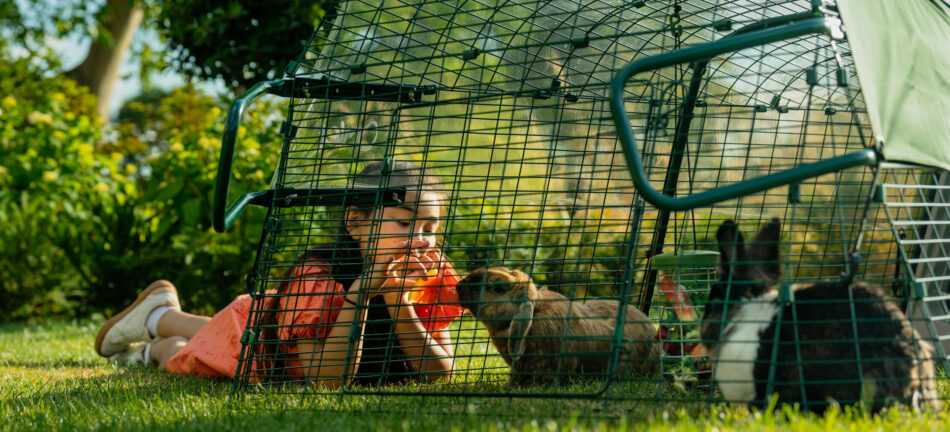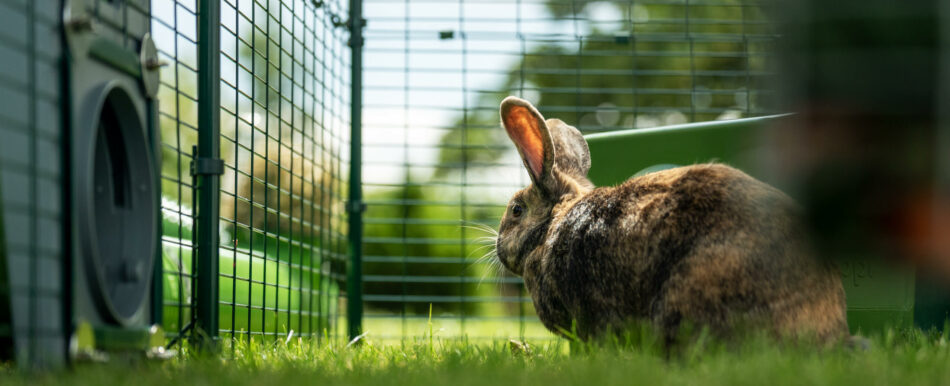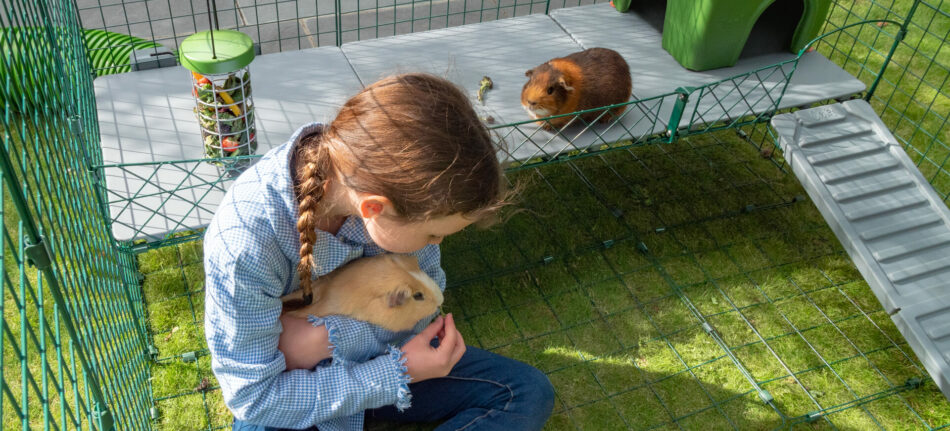Myths about keeping rabbits and guinea pigs
Thinking about adding small pets to your family, but caught up on the myths about keeping rabbits and guinea pigs? There are some common misconceptions about these pets that can sway new owners’ opinions of them. But we’re here to set the record straight and highlight the amazing attributes that these animals have to offer.
Rabbits
Rabbits make wonderful pets for owners of various ages and experience. They’re affectionate, intelligent, and are a joy to watch and interact with. But like all pets, bunnies have characteristics and preferences particular to their species that dictates their care, which has led to several myths surrounding them. Here are some of the most common myths about pet rabbits.
Myth: rabbits are low-maintenance pets for children
Fact: rabbits require daily care and careful interaction
Rabbits aren’t ideal for young children due to their care requirements and the skills needed to handle them safely. Their food and water should be refreshed daily, and they benefit from fresh greens and other rabbit-safe treats a few times a week. Bunnies also need their bedding changed regularly, otherwise they can suffer from flystrike — a serious condition that can result in death. Rabbits also need routine veterinary visits to have their teeth and nails trimmed if needed, and for general health checkups.
Their strong hind legs and sharp toenails make handling rabbits difficult for younger children. And, if startled or handled too roughly, rabbits can bite with their long front teeth. Because of these factors, rabbits should be primarily cared for by an older child or adult.
Myth: rabbits can live alone
Fact: rabbits need the companionship of other rabbits
Many people keep rabbits as solitary animals, but bunnies are very social animals that thrive in pairs or groups. In the wild, rabbits live in large family groups called colonies, and spend their days together. As pets, a pair of rabbits will groom each other, sleep together, and play throughout the day. Same-sex pairs are most successful with females or neutered males, or a spayed female and neutered male.
A singular rabbit can become depressed and listless, or even display negative behaviors like thumping, teeth grinding, or growling. To make sure bunnies live their lives to the fullest, it’s best to adopt them in pairs, or slowly introduce new rabbits together to form a bond. Once bonded, rabbits will live peacefully together for the duration of their lifespan.
Myth: rabbits love to be held and cuddled
Fact: most rabbits are nervous being held
As prey animals, rabbits are easily stressed being picked up and held. The act of lifting your rabbit simulates being snatched by a predator in the wild, and these instincts run deep. As a result, the majority of pet rabbits are not comfortable being held.
This doesn’t mean that you can’t interact or even snuggle with your bunny — you just have to let it be on their terms. Sitting with your rabbit and encouraging them to hop into your lap, or having them hop onto an elevated surface like a rabbit platform before picking them up will reduce the height from which they’re being lifted, making them feel less vulnerable. Slowly acclimating your rabbits to being held or picked up will help them gain confidence.
Guinea Pigs
Guinea pigs are loveable pets with big personalities. They’re adorable, vocal, and fairly easy going, making them ideal pets for owners of all ages — so long as an adult is the primary cavy caregiver. But their appearance and vocalizations have led to some common misconceptions. Here are popular myths about cavies, and what prompted such beliefs.
Myth: guinea pigs don’t need much space
Fact: cavies must live in pairs, and need plenty of space
Don’t let their compact size fool you — guinea pigs need plenty of space. They also need to be kept in pairs, as they form strong social bonds between each other. Always aim to provide as much space as possible with guinea pig runs and playpens.
Guinea pig hutches should be large enough to accommodate two cavies comfortably, and have an attached exercise area. Not only will cooped up cavies become bored, but guinea pigs are prone to being overweight, so exercise is essential. Plus, if you give your guinea pigs enough room, they’ll likely reward you with their trademark “popcorning” move.
Myth: guinea pigs are related to pigs
Fact: they are members of the rodent family
The exact origin of the name “guinea pig” isn’t clear, as they are neither from New Guinea, nor are they pigs. They originated from Peru, and are members of the rodent family. There are various theories as to how they got the first part of their name — from British currency to the trade ship route taken when importing them to other countries. The “pig” portion of their name comes from the vocalizations they make. Guinea pigs are also called “cavies” because the Latin name for them is Cavia porcellus, or “cavy” for short.
As members of the rodent family, they share some similarities with their distant cousins, mice, rats, and even capybaras, the world’s largest rodents. Guinea pigs have incisors (front teeth) that grow continuously throughout their lives, and round eyes on the sides of their head. They lack a noticable tail, making them appear more like large hamsters or tiny capybaras.
Myth: guinea pigs have short lifespans
Fact: they can live up to 8 years with proper care
Rodents generally have short lifespans, but guinea pigs have life expectancies similar to those of rabbits — usually around 6-8 years. In contrast to domesticated guinea pigs, wild cavies, or “cuy” as they’re called in Peru, only have a life expectancy of 1-4 years. But in order to live a long, full life, guinea pigs need the right nutrition.
Guinea pigs can’t manufacture their own vitamin C, so it must be supplemented in their diet. Most commercial guinea pig feed is fortified with vitamin C, but you can supplement their intake with fresh foods like bell pepper or strawberry tops, or with fortified guinea pig treats. Be sure to treat your piggies sparingly, as they can become obese easily.
A myth about rabbits and guinea pigs
Myth: rabbits and guinea pigs can be kept together
Fact: this is true — to an extent
Rabbits and guinea pigs can be kept together, but only with experienced owners and under certain conditions. To keep rabbits and guinea pigs together, the following adjustments and practices must be adhered to:
- Guinea pigs need vitamin C in their diet, while rabbits can produce their own and may become ill if they live on a guinea pig diet. Rabbits also eat more and faster than guinea pigs, meaning cavies might miss out on meals. Always feed rabbits and guinea pigs separately.
- Rabbits and guinea pigs don’t speak the same language, so recognizing the body language of each is crucial to know when one species is stressed or is feeling threatened.
- All animals kept together should be spayed and neutered, but this is especially important when keeping different species together. Intact male rabbits especially can cause serious harm to guinea pigs trying to dominate or mount them.
Keeping these two species together is possible, if you have adequate space and separate feeding areas for each. Pay special attention to their personalities and assess whether separation is needed at any point in time.
Omlet and your rabbits and guinea pigs
No matter which species you keep, our rabbit and guinea pig hutches have been designed to support the needs and preferences of both bunnies and cavies. With customizable rabbit and guinea pig tunnels and outdoor pet runs, you can simulate their natural environment to help them get in touch with their innate behaviors. When you appeal to their wild side, you’ll be rewarded with healthy, happy rabbits and guinea pigs that will never cease to amaze and inspire you.
This entry was posted in Guinea Pigs



